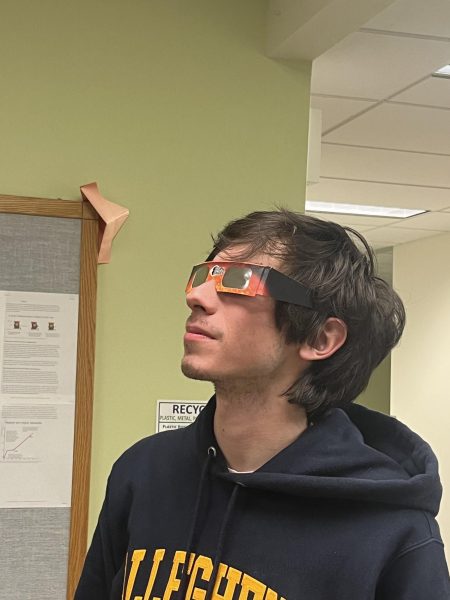Wahl’s senior project contributes to Allegheny’s ‘Year of Mindfulness’
“My adviser [Joshua Searle-White] and I, we weren’t expecting results like this,” Nadiya Wahl, ’17, said.
The results of Wahl’s senior comprehensive project, “Ancient Wisdom, Modern Science: An Empirical Look into Chakra Meditation,” proved to be more successful than expected and have contributed to the campus’ Year of Mindfulness.
One of Wahl’s participants — who could not be identified by name due to restrictions placed by the Institutional Review Board — said she participated because it was the Year of Mindfulness.
“When [Wahl] came into my psychology class searching for participants for her experiment, I figured since it was the Year of Mindfulness that I would take the opportunity to try and better myself,” the participant said.
Another participant said they were attempting meditation for the second time.
“After [Wahl] explained her project in my class, I admit that I was skeptical,” the participant said. “I had practiced meditation before and I wasn’t successful in reducing my stress, but her study seemed new and promising. I wanted to try again.”
As a psychology major, Wahl wanted to combine her personal interests and her field of study to create a therapeutic experiment for her senior comprehensive project.
“I grew up around meditation, and I became interested in eastern philosophy and spirituality because of my parents. They both practice yoga and meditation,” Wahl said. “They were my main influences to start studying chakras.”
In the Sanskrit language, “chakra” literally translates to the word “wheel.” Hindu and Buddhist philosophy describe chakras as seven individual centers, or wheels within the human body that energy flows through, and are located on the midline of the body.
“The unification of the mind, body and spirit … in general is left out in Western philosophy,” Wahl said. “Theories on the chakra system vary, and the benefits of opening up a chakra hadn’t been tested. I made meditation scripts for each chakra, and I wanted to test if meditation would unlock a chakra. Could this be empirically tested and prove to work?”
Wahl is one of Assistant Professor of Dance and Movement Studies Eleanor Weisman’s students, and she is well versed in the study of yoga and meditation.
Weisman said that chakra’s are energy systems that “correspond to the nero entrican glands in our body.”
“The nero entrican glands are called that because they are known to secrete hormones, and they actually correspond to what the ancient people called the chakras, so they recognized that there were energy centers even though they didn’t really know what these physical bodies in our bodies do,” Weismann said.
Weisman said she is confident that meditation can help unify the body and mind as well as relieve stress and anxiety.
“[Meditation] really helps balance one’s energy,” Weisman said.

Nadiya Wahl’s senior composition was focused on the practice of chakra meditation. She conducted her study in the Prayer and Meditation house. study in the Prayer and Meditation house.
Wahl recruited 52 participants — who were split between two different groups — for her experiment to test if meditation could unlock chakras, allowing the individual to reap psychological benefits. The study took place in the Prayer and Meditation House on Allegheny’s campus.
“I was surprised by the amount [of] participation. We had expected 30 students to, but had much more participation,” Wahl said.
Wahl was comparing an experimental group to a control group, and both groups engaged in seven separate experimental sessions, each session lasting 20 minutes. The participants of the study were not aware of the group they were randomly assigned. The experimental group practiced meditation focused on unlocking one of the seven chakras. The control group did not practice meditation, and instead merely focused on their breathing patterns.
“I was testing stress levels and self-actualization levels,” Wahl said. “I theorized that participants’ levels of stress would decrease in both the experimental group and control group. Self-actualization would increase in the experimental group, but not in the control group. Self-actualization and the chakra system are one in the same — to have a balanced chakra system is to be self-actualized.”
Through the use of individual questionnaires answered by participants prior to the experiment and at the conclusion of the experiment, Wahl said she received promising preliminary results.
“The focus on breath in the control group proved to be beneficial. In the control group and the experimental group, the participants’ stress levels decreased,” Wahl said.
However, Wahl found the results to her tests involving self-actualization and the experimental group more significant. The participants in the experimental group on average indicated that they felt more self-reliant and more self-accepting at the conclusion of the experiment.
“Participants claimed to be more in touch with their inner-selves after participating in my experiment, and it’s not even comparable to the control. Isn’t that fascinating, that the practice of meditation could that significantly vary the results?” Wahl said.
One of Wahl’s participants said they were glad they decided to get involved in the study.
“I had negative thoughts entering [Wahl’s study], and I didn’t think anything would change,” another participant said. “I actually think I learned more about myself from it.”
Wahl now intends to apply to the Undergraduate Research Day at the Capitol held in Harrisburg, Pennsylvania on April 25 to present her findings. After her graduation from Allegheny College this upcoming spring, Wahl plans to volunteer at the Pumpkin House Children’s Orphanage in Ahmednagar, India.
She said she thinks her work in India will help mold her career. Wahl intends to become a child therapist and believes she will best serve her clients through the practice of yoga and meditation.





Jennie Geisler • Mar 23, 2017 at 2:24 pm
Looking to speak with Nadiya about her project for a story I’m doing in the Erie Times-News about Mindfulness. Give me a shout at 814-870-1885, or text 814-969-2208, or email.
Kaleigh O'Rourke • Feb 26, 2017 at 9:46 am
Really cool project! As an alumna I’m always so proud of this school and it’s students! Just to clarify chakras are supposed to coresspond to “neuroendocrine” glands. They’re the conecction between the mind (neuro) and hormones (endocrine). The science behind mindfulness is a growing body of knowledge and it’s awesome to see Allegheny adding to that!